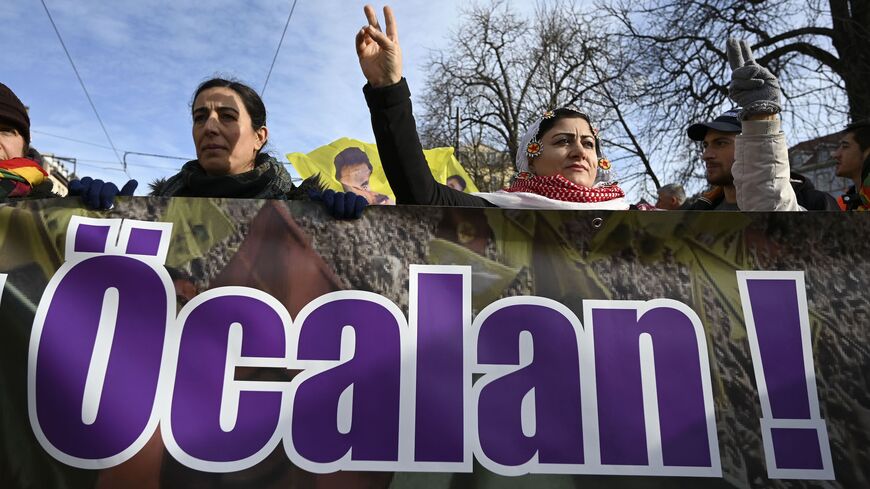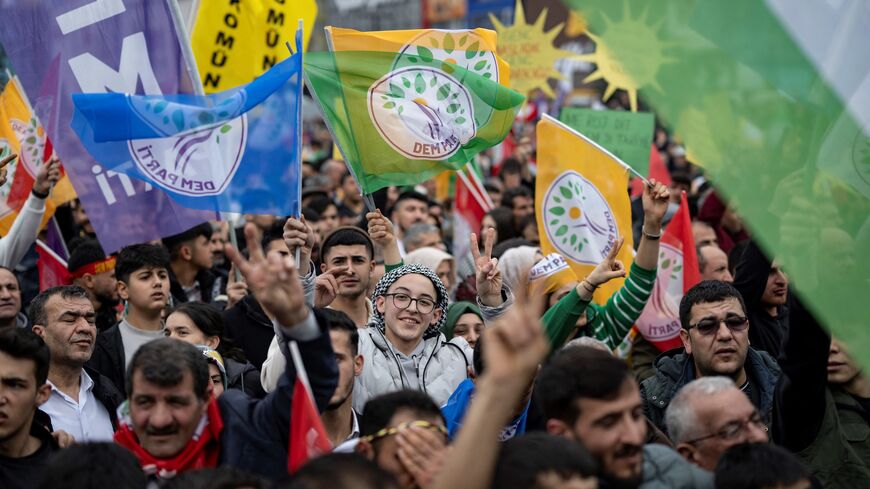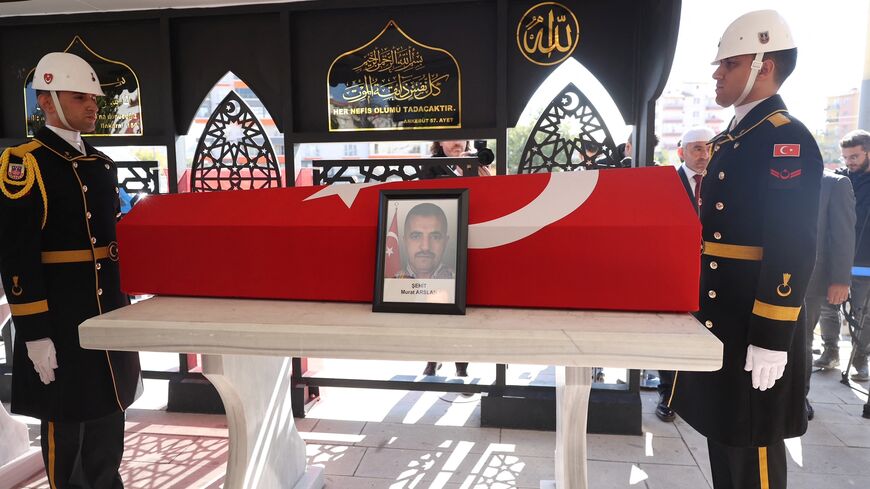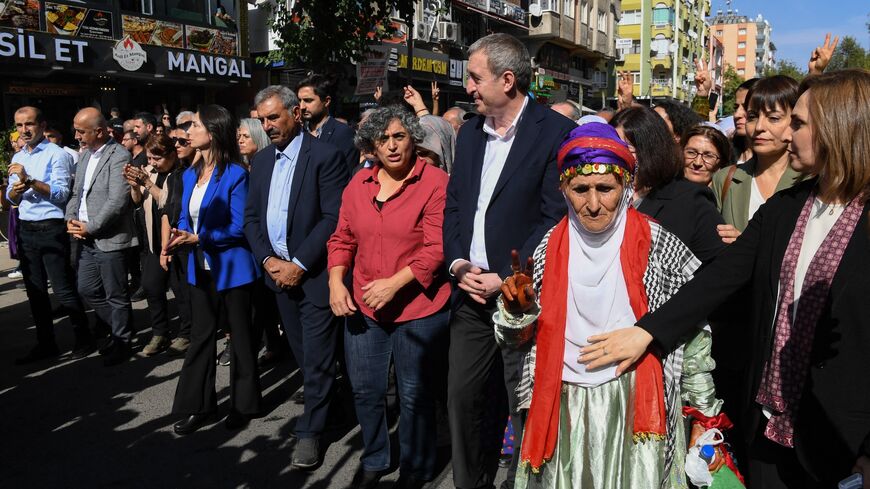In shift, Erdogan's top ally says Ocalan’s life sentence can be reassessed if PKK disbands
Devlet Bahceli also suggested that the conditions of the militant leader’s life sentence without parole be reconsidered if he agrees to make such a call.

ANKARA — In a shocking U-turn in Turkish politics, Devlet Bahceli, a key ally of Turkish President Recep Tayyip Erdogan and leader of the Nationalist Movement Party (MHP), suggested that the conditions of Abdullah Ocalan’s life sentence without parole should be reconsidered if the Kurdish militant leader agrees to declare the dissolution of his outlawed armed group.
The Kurdistan Workers Party (PKK) has been waging an armed campaign for Kurdish self-rule inside Turkey since 1984 and is considered a terrorist organization by Turkey, the United States and the European Union. PKK leader Ocalan, 75, has been serving a life sentence at the Imrali prison island off the coast of Istanbul since 1999.
“Let him [Ocalan] declare that terrorism has completely ended and that the organization has been dissolved,” Bahceli said. “If he shows this resolve and determination, then the path can be fully opened for making a legal regulation on the use of the right to hope and for him to benefit from it.”
Bahceli referred to a 2014 European Court of Human Rights ruling that ordered Turkey to grant a “right to hope” to convicts who serve life sentences without parole. Turkey’s laws deprive those convicted on terrorism charges of this right.
In a televised address to his party members in parliament, Bahceli even suggested that if Ocalan agrees to make such a speech, he could deliver it in parliament. Ocalan has been largely isolated, with only limited contact with his lawyers and family. Turkey’s pro-Kurdish DEM Party has long demanded the lifting of Ocalan's isolation.
“If the isolation of the terrorist leader is lifted, let him come and speak at the DEM Party group meeting at the Grand National Assembly of Turkey,” Bahceli said.
These comments come as reports suggest that the Turkish government is considering using diplomacy in addition to military measures to solve the 40-year-old armed conflict. Al-Monitor was the first to report earlier this month that exploratory talks were underway for a possible resumption of peace negotiations between the government and Ocalan.
Bahceli, however, did not mention negotiations, instead endorsing democratic reforms as part of a broader solution.
“The most reasonable option is to implement democratic reforms and social and economic arrangements, while the fight against terrorism continues relentlessly on one hand,” he said.
Following his speech, MHP Vice Chair Feti Yildiz described Bahceli's proposal as a turning point.
“Oct. 22 is a milestone in Turkish politics,” he posted on X. “From this day forward, all political assessments will be made in terms of before Oct. 22 and after Oct. 22."
Bahceli’s rhetoric marks a major departure from his and his nationalist party’s belligerent language toward the DEM and their oft-repeated calls for a political ban on its lawmakers. Some MHP lawmakers also call for the reinstatement of the death penalty for certain terrorism-related crimes.
The statement comes as part of a detente between Turkish and Kurdish nationalists in the period that kicked off after Bahceli shook hands with DEM Party lawmakers during the opening session of the Turkish parliament Oct. 1.
Speaking later on Tuesday, Erdogan described his ruling alliance’s stance as a historic opportunity. “We expect everyone to realize that there is no place for terrorism and its dark shadow in Turkey’s future,” Erdogan said during a live speech in Ankara. “We do not wish for the historic opportunity opened by the People’s Alliance to be sacrificed for personal interests.”
The DEM Party, in response, vowed to work toward a “dignified peace,” with the party’s co-chair, Tulay Hatimogullari, reiterating her call for the removal of Ocalan from isolation.
“The path to a solution is the Turkish parliament. We are ready to take initiative,” she said. “As a starting point, the isolation should be lifted.”
Another DEM lawmaker, Sirri Sakik, said the nation could see “more significant developments in the coming days.”
In a draft bill that Sakik submitted to parliament last week, the lawmaker demanded legal amendments to allow Ocalan and other terror convicts to benefit from the right to hope, but the ruling coalition has yet to bring the proposal to the agenda.
Cautious support from main opposition
Bahceli's statement, which surprised many in Turkey, received cautious support from the main opposition Republican People’s Party (CHP).
CHP leader Ozgur Ozel linked the ruling alliance’s recent moves to Erdogan’s effort to draft a new constitution that would also pave the way for the Turkish president to run for another term.
“It smells like a plan designed to solve Erdogan’s problem, not Turkey’s problem, and that's why it smells bad,” he said.
Prior to the May 2023 general elections, from which Erdogan and his ruling party emerged victorious, the ruling alliance frequently targeted the CHP-led election coalition with unsubstantiated claims that they would free Ocalan if elected.
Yet ahead of his visit to Turkey’s predominantly Kurdish southeast on Wednesday, Ozel also expressed his support for all efforts to end the armed conflict.
“If this country will be united and together, and if no weapons will be pointed at our soldiers, then every word spoken and every actor who speaks for this cause is valuable,” he said.
Meanwhile, some commentators questioned whether the PKK would agree to disband itself even if Ocalan made such a call.
During the latest round of peace talks between the then-Erdogan administration and the PKK, Ocalan called on his fighters to withdraw outside of Turkey’s borders.
“We reached the point where weapons should go silent and ideas speak,” Ocalan’s 2013 Newroz message read.
Following the collapse of the peace talks in 2015, Turkey's predominantly Kurdish southeast was dragged into nearly a year of bloody urban warfare between Turkish forces and PKK militants.
Ocalan, who founded the PKK nearly half a century ago, has been in solitary confinement since 1999 and is hailed as an icon by some Kurds but denounced by many Turks as a terrorist.
Two key questions
"Can Ocalan ensure that the PKK lays down its arms despite Qandil? That is not realistic," said Rusen Cakir, a veteran journalist who closely follows the Kurdish issue, on MedyaScope TV, an independent online news platform, referring to the PKK's headquarters in the Qandil Mountains of northern Iraqi Kurdistan.
Murat Karayilan, leader of the PKK’s armed wing, last week dismissed any prospects of peace in response to the reports of a potential revival of negotiations between the government and the militant group.
Yet Cakir noted that the ruling alliance may be considering the recent moves as a first step. “They may be approaching a first stage in which they reach an agreement with Ocalan and the DEM Party on certain issues, and then others will be forced to follow suit,” Cakir said.
Ozgur Unluhisarcikli, Turkey director for the German Marshall Fund of the United States, raised another question: Would such an initiative contribute to reversing Turkey’s democratic backsliding or further consolidate anti-democratic practices?
In response to Bahceli’s mention of Ocalan’s “right to hope,” many in Turkey recalled the fate of dozens of activists and politicians who remain behind bars over thinly substantiated charges. Among them are Osman Kavala, a prominent human rights activist, and the country’s most influential Kurdish political leader, Selahattin Demirtas.
Still, Unluhisarcikli believes both domestic and foreign developments present an auspicious climate for the potential success of the efforts.
“Regional actors, both state and nonstate, who could potentially disrupt a negotiation process are preoccupied with other crises, reducing the likelihood of external interference,” he told Al-Monitor.
The ongoing war between Israel and its foes has forced regional countries to seek more stability at home and around their borders. Iran, which Turkey sees as a problematic neighbor in cooperation against the PKK, is currently focused on its escalation with Israel.
Moreover, the increasing effectiveness — thanks in part to Turkish armed drones — of Turkey's military operations in northern Iraq casts doubt on how much longer the PKK can sustain its armed conflict.
“The PKK has suffered significant degradation, weakening its operational capacity,” Unluhisarcikli said.
“The potential US withdrawal from Iraq and Syria further exposes the YPG, the Syrian branch of the PKK, making it more vulnerable and altering the strategic calculus in [Turkey’s] favor,” he added.
Yet he warns of a series of possible pitfalls in the management of potential negotiations. “While the timing may be opportune, the outcome hinges on the structure and execution of a potential peace effort,” he said. “There is a limit to what Turkish society can tolerate, and I am not sure an address by the leader of the PKK at the parliament is within the limit.”
However, the real purpose of Bahceli’s call may not be to actually bring Ocalan to parliament, but rather to reflect his own decisiveness.
“It rather reflects how serious Bahceli is about the resolution of the terrorism problem,” a source who has worked with Bahceli's MHP for years told Al-Monitor on condition of anonymity due to the sensitivity of the issue.
This is a developing story and has been updated.







